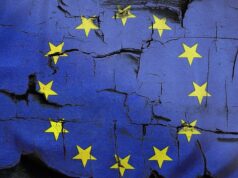
After the EU election, conservatives and social democrats must prepare for a more difficult majority in the European Parliament. For the first time in 40 years, the two major party families lost their arithmetical absolute majority on Sunday. Despite victories in France, Italy and the United Kingdom, the growth for right-wing populists and nationalists remained limited, turnout reached almost 51 percent, the highest level in two decades.
The Conservatives with their top candidate Manfred Weber (CSU) were once again the strongest force, but suffered like the second-placed Social Democrats significant losses. The Greens set a record result.
The conservative European People’s Party (EPP), according to preliminary results, came to 179 of the 751 seats in the European Parliament. That was 42 fewer than after the election in 2014. That was „not a powerful victory,“ admitted top candidate Weber. Social Democrats received 150 seats, 41 fewer than five years ago.
Liberal third strongest force
The Liberals were 107 seats, making them the third largest fraction. However, the European Parliament has already included the list of the ruling party La Republique en Marche headed by France’s head of state Emmanuel Macron and a Romanian party that wants to join them.
From the sixth to the fourth strongest force, the Greens moved up, which achieved a record result in Germany and surprisingly came in third place in France. According to preliminary results, their group now has 70 seats – 20 more than at the beginning of the 2014 election period. A „green wave“ has spread throughout Europe, said co-chef Philippe Lamberts.
Significant profits for right-wing populists
The right-wing populist Europe of Nations and Freedom Group (ENF) posted significant gains. She went from 36 to 58 seats. It includes, among others, the party of the French right-wing populist Marine Le Pen, who was ahead of Macron’s governing party and thus, as in 2014, the strongest force in the European elections in France.
In Italy, the Legate of Interior Minister Matteo Salvini, who also belongs to the ENF, clearly took first place. The leading five-star movement in the Italian general election a year ago, with which the Lega forms the governing coalition, made it only to third place.
Farage in first place in the UK
In the UK, the newly formed Brexit party of EU opponent Nigel Farage came from a standstill with 31.6 percent in first place. The governing conservative Tories were punished in view of the already several times postponed EU exit and ended up according to partial results with 9.2 percent only in fifth place.
The Europe of Freedom and Direct Democracy (EFDD) Group has grown from eight to 56 in the wake of Farage’s success. The Europe-skeptical group of the European Conservatives and Reformers (ECR) lost twelve seats and now holds 58 seats.
EU election triggers new election in Greece
Losses had to be suffered by the European Left. Her faction lost 14 seats and landed at 38 seats. In Greece, Prime Minister Alexis Tsipras announced „immediate“ new elections after his left-wing party SYRIZA had landed significantly behind the Greek Conservatives.
Special Summit in Brussels
Tomorrow evening, the EU leaders will meet at a special summit in Brussels. It is all about the question of who succeeds EU Commission President Jean-Claude Juncker. The European Parliament demands that, as in the 2014 election, this could only be a top candidate of the parties. Heads of State or Government do not exclude other candidates.
Conservatives and Social Democrats initially claimed the top posts for themselves. However, their top contenders were more cautious in view of the difficult majority. Weber was open to talk to other parties about the top job.
Social Democratic leading candidate Frans Timmermans said he wanted to try to form a „progressive coalition“ around a joint program. Only then does the question of the commission’s leadership arise.



